

One Teacher's Adventures
Search this blog, free french projects for grade 6-8 core french (fits new bc curriculum).

- Learning about Francophone communities helps us develop cultural awareness.
- There are many Francophone and Francophone Métis communities across Canada
- Basic information about a Francophone or Francophone Métis community in Canada
- Demonstrate awareness of Francophone and Francophone Métis communities across Canada
- Recognize that some Francophone communities are connected to First Peoples communities
- Identify and share information about a Francophone community in Canada
- Deepening our knowledge of Francophone communities helps us develop cultural awareness.
- Information about Francophone and Francophone Métis communities across Canada
- Francophone people live on First Peoples territories across Canada
- Identify, share, and compare information about Francophone and Francophone Métis communities in Canada
- Identify cultural aspects of Francophone communities
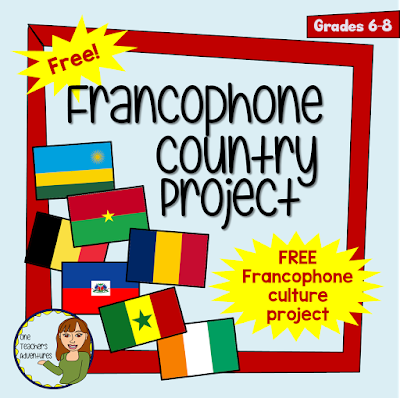
- Where French is spoken around the world
- Share information using more than one mode of presentation
- Identify cultural aspects of Francophone communities
- Demonstrate basic awareness that there are Francophone communities around the world
- Acquiring a new language and learning about another culture deepen our understanding of our own language and culture
- There are many Francophone communities around the world
- Information about Francophone communities around the world
- Cultural aspects of Francophone communities, practices, and traditions
- Identify and share information about Francophone communities around the world
- Describe cultural aspects of Francophone communities, practices, and traditions
- Describe similarities and differences between their own cultural practices and traditions and those of Francophone communities

Hi there, I'm curious if you allow students to complete these projects in English?
Hi! I expect the kids to complete these in English. These projects fit the cultural competencies for Core French, not the language competencies, so they can complete it in English. Most of my Core French kids don't have the language capabilities to do this work in French.
Post a Comment
Popular posts from this blog, come to canada a travel brochure using typical canadian stereotypes., using disney's "inside out" with middle schoolers, water cycle foldable.
The LEAF Project
- Language Learning
- Research Projects
- Folium: Living Global
- Terra: Phototravel
- Aero: Study Abroad @ FLCC
Project Resources: Research Project Topic Ideas (French/Francophone)
Posted by LEAF Architect on Wednesday, January 25, 2012 · Leave a Comment
Project Resources: Creative Project Areas of Interest (French/Francophone) via Wikimedia Commons
IF YOU WANT TO IMMERSE YOURSELF IN FRANCOPHONE CULTURE:
- Research some aspect of culture of a particular French-speaking country/region.
- Research a national holiday in a French-speaking country.
- Research a religious holiday in a French-speaking country.
- Research a celebration in a French-speaking country (birthday, wedding, or other life-cycle celebration).
- Research one of the regional languages spoken in France (Breton, Occitan, Provençal, Corsu, etc.) and the traditional culture of the people who speak it.
- Research the indigenous culture of a French-speaking country (other than France).
IF YOU LIKE ART OR ARCHITECTURE:
- Research a well-known Francophone artist.
- Research a specific piece of art created by a Francophone artist.
- Research a specific art form or art movement in a French-speaking country/region.
- Research the architecture of a Francophone city.
IF YOU LIKE MUSIC:
- Research a well-known Francophone composer.
- Research a well-known Francophone musical group.
- Research a specific Francophone musical genre.
- Research a well-known piece of Francophone music (popular song, classical piece, opera, etc.)
- Research the national anthem of a French-speaking country and the history behind it.
- Compare/contrast the musical traditions of 2 different French-speaking countries.
IF YOU LIKE TO READ OR WRITE:
- Research a well-known Francophone writer.
- Research a specific Francophone literary genre.
- Research a well-known piece of Francophone literature.
- Research current events in a French-speaking country.
- Research the literacy rates among French-speaking countries.
IF YOU LIKE HISTORY OR GEOGRAPHY:
- Research the history of a specific French-speaking country/region.
- Research a well-known Francophone historical figure.
- Research a well-known Francophone world leader or political figure.
- Research French/Francophone immigration in the USA.
- Research the geography of a specific French-speaking country/region.
- Research significant rivers, mountain ranges, or other geographical features of France or another French-speaking country.
- Research the ways in which the geography and climate of a specific French-speaking country influence the diet of the people who live there.
IF YOU LIKE DANCE OR SPORTS:
- Research a traditional folk dance of France or another French-speaking country.
- Compare/contrast the traditional folk dance forms of 2 different French-speaking regions.
- Research the Tour de France, including its history and significance.
- Research soccer in a specific French-speaking country and the differences in the culture, importance, fan support, player attitudes, etc.
- Research a well-known Francophone athlete.
- Research the national team of a particular sport in a specific French-speaking country.
IF YOU LIKE FOOD:
- Research the cheeses of France, including their cultural and anthropological significance.
- Research the breads or pastries of France, including their cultural and anthropological significance.
- Research the history and cultural/anthropological significance of another specific food item or dish from a specific French-speaking country/region/people.
- Research the typical diet of a specific French-speaking country/region/people.
- Compare/contrast the cuisine of 2 different French-speaking countries.
- Research the wine industry in a specific region of France.
IF YOU LIKE TV OR MOVIES:
- Research the history, background, and significance of a specific French-language TV station.
- Research the history, background, and significance of a specific French-language TV program.
- Research the history, background, and significance of a specific genre of French-language TV programming (news, game shows, soap operas, etc.)
- Research a well-known Francophone TV or film star.
- Research a well-known Francophone film director.
- Research the film industry of a specific French-speaking country.
IF YOU LIKE TO TRAVEL:
- Research the attractions in a specific French-speaking city/region/country (monuments, museums, nature, geography, cultural/historical sites, etc.).
- Research the travel and tourism industry in a specific French-speaking country/region.
- Research study abroad opportunities for your area of study in a specific French-speaking city/region/country.
- Research job opportunities in a French-speaking country for 1 or 2 specific careers.
- Research and explore French influences in the USA.
IF YOU LIKE SHOPPING:
- Research the products for which a specific French-speaking country is known, including the history and significance of each product.
- Research the French fashion industry.
- Research a well-known French fashion designer.
- Research the well-known department stores of France.
IF YOU HAVE NATIVE FRENCH SPEAKERS IN YOUR FAMILY / OR CLOSE FRIENDS:
- Research your family history.
- Research the family history of your French-speaking close friends.
- Research the French-speaking country that your family member/close friend came from.
- Research the historical, political, economic, religious, and/or other conditions that led your family members/close friends to emigrate.
Category: Project Resources , Resources · Tags: creative , francophone , french , ideas , interest , LEAF , project , synthesis
Recent Posts
- Spanish Grammar: Imperfect Past Tense with Regular [-IR] Verbs
- Folium: A Surprising Explanation For Why Some Immigrants Excel In Science via NPR
- Folium: Listen to Endangered Indigenous Languages From Around the World via Google Earth

All Resources from The LEAF Project are protected under the Creative Commons License. CC Attribution-NonCommercial 4.0 International .
You must be logged in to post a comment.
Get a FREE reading comprehension article on the origins of maple syrup & le temps des sucres

Anti-racism & Representation
Professional development, 10 ways to teach about francophone countries.

Teaching about Francophone countries is arguably one of the most important aspects of teaching French. Today I am going to be sharing with you all of the ways in which I teach about Francophone countries & Francophone cultures in my own classroom! I have the problem of actually having way too many ideas than I have time with my students to do them all!
Before you scroll – don’t forget to grab your freebie!
Why should we teach about francophone countries.
It’s pretty simple actually. Francophone countries should be the “meat and potatoes” of French class. You may be wondering why and it’s pretty simple :
Francophone countries and cultures make French class interesting and meaningful
A language does not exist in a vacuum. As a matter of fact, a language is intricately connected to culture as culture is connected to language.
It is not fun to learn grammar and vocabulary solely and to never learn of the people, values, cultures, traditions and practices associated with that language.
Every year, my students comment that their favourite learning opportunities in class were ones where they learned about the people who speak French.
The people and countries who speak French are diverse and not showcasing this diversity is whitewashing
I know – my words sound strong. However, we are not doing the language and the people justice if we only ever represent white francophones.
First of all, places like France, Quebec, Belgium, Switzerland are also incredibly diverse. On the other hand, African French-speaking countries also deserve to explored and discovered in French class. Then there’s also the French Antilles and the resilient cultures and people that live there.
How should we teach about francophone countries?
Avoid tokenizing francophone countries and cultures.
What does this mean? Well, it means that francophone cultures and countries are incredibly unique. Therefore, no one “resource” or “unit” can cover the complete uniqueness, complexity and diversity of the francophone world.
Ideally, every single one of our units and lessons should be sprinkled with francophone cultures.
Be conscious of the colonial nature of our work
Francophone cultures and countries should be studied for their diversity and uniqueness, and not solely because “they speak French”.
Remember that the French language and French Empire were incredibly violent and destructive to the people and cultures who now speak the language. When we are teaching French, we should try to avoid the perspective that the French language is inherently superior.
“But there are no diverse French resources”
Before we get on to my 12 ideas for teaching about la francophonie , I want to quickly address this statement I often hear from French teachers.
It is not true! There are actually so many incredible resources that exist out there. It is just a matter of finding these resources.
1. Manie musicale & French music in general
One of my favourite ways to “sprinkle in” culture is through French music! First of all, Manie Musicale was not my idea. It was actually the original idea of two French teachers who have generously created resources based on the activity. They also have an awesome Facebook group you can join.
Chanson de la semaine
The premise is simple. Each week I introduce my students to two new French songs. These French music videos always featured artists from diverse backgrounds. In addition, I also try to choose songs on topics that make my students think critically and creatively about the world around them.
I have a YouTube playlist with all of my favourite songs if you’d like to check them out!
Additionally, music in general is such a fantastic way to analyze different cultures.
Radio.garden is an international radio station where you can tune into radio stations from around the world. Last week we listened to the radio in Guadeloupe and Senegal and compared accents and musical preferences in comparison to our own! Each green dot on the map represents a radio station you can listen to!
There are actually so many ways to teach with French music. I have a whole blog post dedicated to ideas and resources. You can also find a blog post with some of my favourite diverse singers.
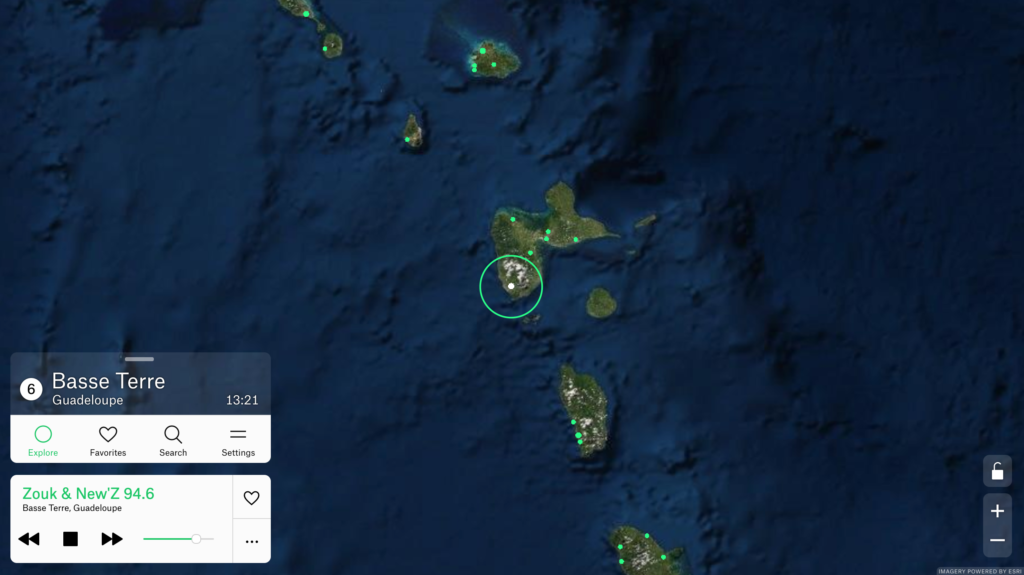
2. Francophone countries map assignment
One of the very first assignments my High School French students do is a map assignment. I am a millennial teacher who did tons of map assignments in my History undergrad. Contrary to popular beliefs, I actually learned so much from them!
Pick 30-40 francophone places around the world and have your students colour in these places on a map. I also have my students label them in French. Here is a website with free black and white map printables if you need one!
3. Francophone countries flag assignment
This is one of the assignments my students do in the beginning of their studies. They research one francophone location around the world and create these lovely flags with all of the information they find.


4. Francophone countries game – can you place the country on the map?

I LOVE playing this game with my students. It’s so simple. I divide my class into two groups and have 1 member of each group come up to the front.
Next, I project a map of the world on my whiteboard. Above this map, I list the name of a francophone country in French.
Both members have to run up to the board and circle where on the map they believe that country is located.
Team members are allowed to vocally help their teammate. This game is so fun because students learn a lot about how much they actually know the world map and where countries are located!
My students always beg me to keep going once the game ends. That’s how much they love it!
5.Teaching about the French Antilles via Compagnie Créole
I spend weeks in French 9 teaching all about the French Antilles. It is actually one of my favourite things to teach about.
La Compagnie Créole is a very famous Zouk band from the French Antilles. La Compagnie Créole was very famous all around the francophone world in the 1980s. I take three of their songs and have my French classes analyze them to the T. We analyze :
- Le bal masqué
- Ça fait rire les oiseaux
- Au mariage de ma femme
To begin, we analyze the meaning of the lyrics. These lyrics are honestly so fun, especially the last song, and my students find them super entertaining!
Next, we do what we can as a class to understand the significance of the lyrics. We ask ourselves the following questions :
- what do the lyrics say about what is important to the people of the French Antilles?
- why are the people dressing up for Bal masqué? Why is that important?
6. Teaching about Francophone countries via films
Using French films in your classroom is one way to have incredibly meaningful discussions. Here are some of my favourite French films for French class :
Monsieur Lazhar
Monsieur Lazhar is a Québecois film about the story of an Algerian refugee. This French movie was really popular several years ago and for good reason!
TW : suicide
Le sac de billes
Le sac de billes is a French film about a Jewish family in Paris during WWII. We watch this French movie in my Intermediate French class and my students love it!
Maurice Richard
Maurice Richard is an awesome French movie on the life of the greatest hockey player of all time, Maurice Richard.
Kuessipan is a book written by Innu author Naomi Kuessipan. It was turned into a film and released in 2020. It was one that I have not watched, however, I have read the book and it was one of my favourites of 2020!
7. Francophone celebrations and traditions
Another way to teach about francophone cultures is through francophone celebrations and traditions! I don’t just mean the usual (e.g. Christmas, Mardi Gras, etc.). There are so many unique and beautiful francophone celebrations that deserve more love!
If you are looking for a resource, I have one that is prep-free and ready to go in my TPT .
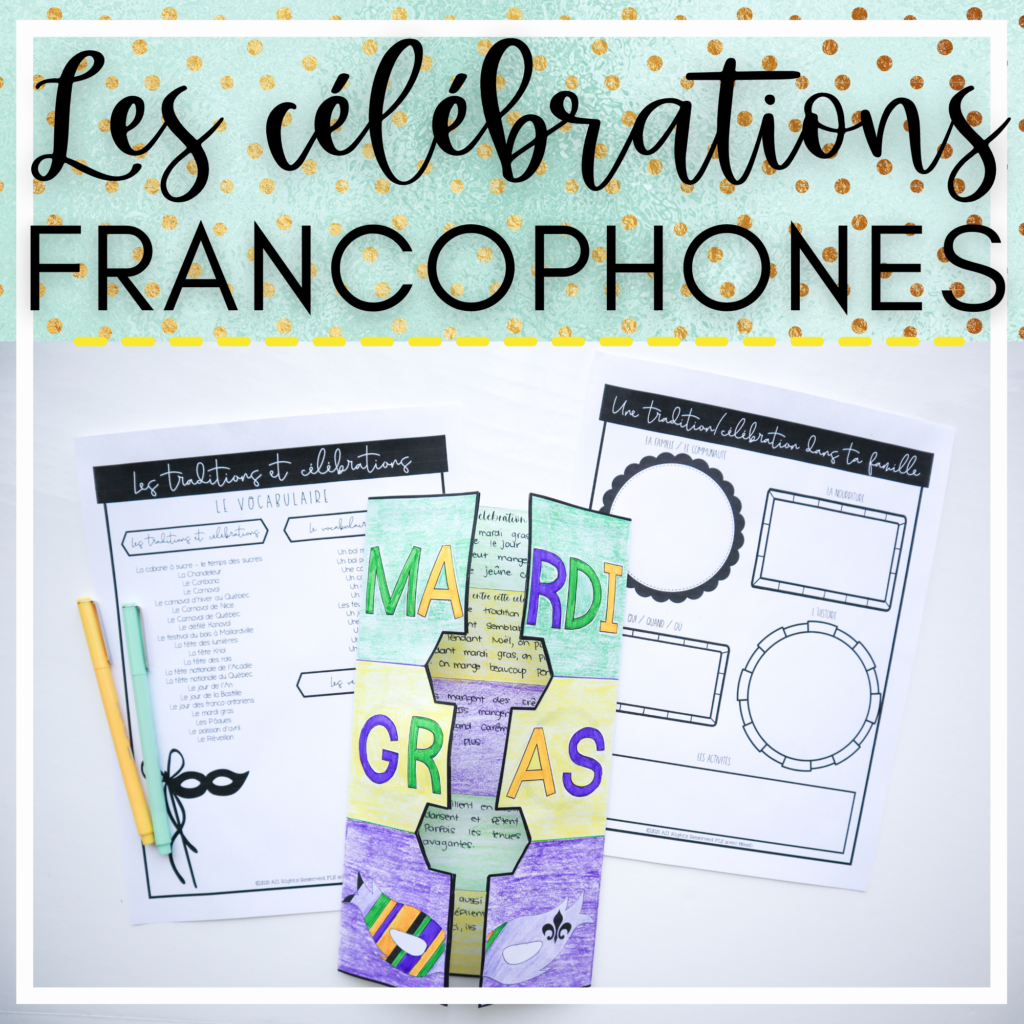
8. Teaching about racism, identity, and Verlan in France
This next idea has one of my most successful unit ideas. In my intermediate French class, I teach about verlan, youth identities, and systemic racism.
It may feel as though this is a heavy unit, however, my students told me that it was the most meaningful thing they have learned the whole school year!
So many of my students who had previously never loved French and/or were never engaged in projects completed their final project EARLY AT HOME BY CHOICE . TEACHERS (sorry for yelling) — you know exactly how much of a win that is!!
I actually have a whole blog post dedicated to this unit. In this blog post I share the template for the one-pager final project, videos, podcasts and articles I used with my intermediate French students .

9. Introducing interesting topics and themes via reading comprehension articles

Another way we explore francophone countries & francophone cultures is via interesting French reading comprehension articles.
First off, my reading comprehension activities are well-structured with pre-reading & post-reading activities. These strategies actually repeat in all of my comprehension resources.
This enables our students to practice these reading comprehension strategies over and over again. It has made a HUGE difference in my students’ reading comprehension skills!
Examples of engaging reading comprehension topics :
- Le petit-déjeuner, plats typiques et desserts francophones
- Francophone places around the world
- Seasonal Francophone readings (Halloween, Noël, Mardi Gras)
- Francophone cul tural topics
- Fêtes culturelles et religieuses – Vaisakhi, Ramadan, Nouvel an lunaire, etc
- Fêtes francophones
- Monuments francophones
- Colonial injustices with lasting legacies
10. French videos, short films and documentaries on la francophonie
Lastly, I love using French videos, short films and documentaries to showcase complex identities and perspectives. I have shared some of my favourite French video recommendations on Instagram and I am leaving them below for you!
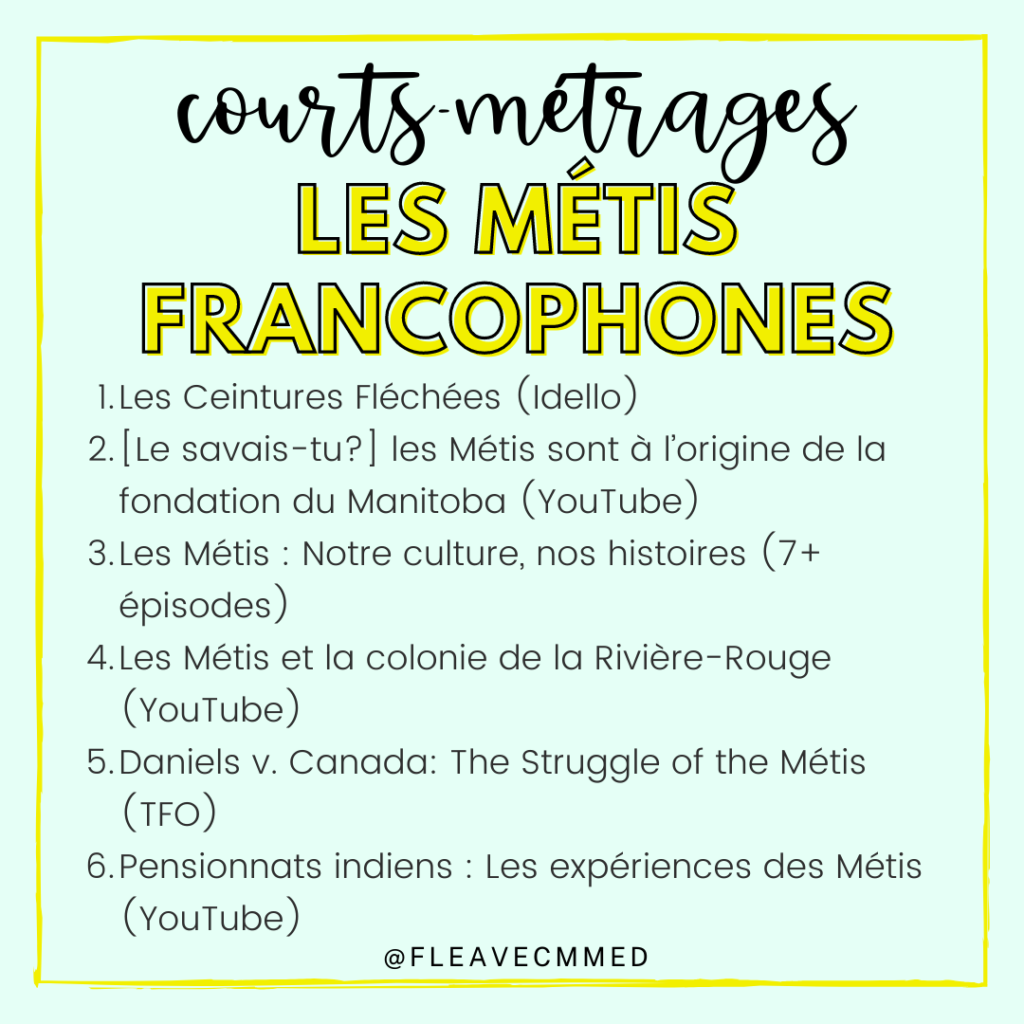
11. Do a unit study on a specific Francophone country
Focusing one specific Francophone country is such a great way to expand students’ understanding of the Francophone world in all of it’s complexities.
Once they graduate, they will forget how to conjugate verbs or explain the difference between être and avoir. However, they will never forget about tagine or Léopold Senghor!

- Read more about: Francophone Cultures , Ideas & Inspiration , Representation & Diversity
You might also like...

French Back to School Bulletin Board Ideas
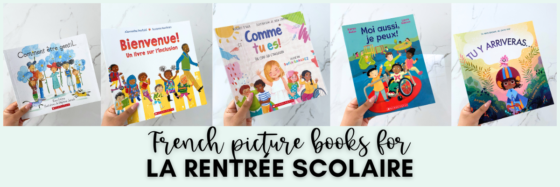
5 French Picture Books for la Rentrée Scolaire

Here’s why you need to try French Back to School Stations
Follow along, @fleavecmmed.

Parfois je suis un renard
Get a FREE activity to accompany the picture book Parfois je suis un renard
© FLE Avec MmeD • Website by KristenDoyle.co

COMMENTS
A regional or country study is an excellent means of using French while simultaneously learning about the world of Francophonie. The reports can be put together as a sort of encyclopedia of francophone countries and regions. This project is great for independent students too!
Identify, share, and compare information about Francophone and Francophone Métis communities in Canada. Identify cultural aspects of Francophone communities. Francophone Country Project. The second project fits with …
Research a well-known Francophone world leader or political figure. Research French/Francophone immigration in the USA. Research the geography of a specific French …
Brown University produces this guide to online research resources of the literature and culture (dance, art, music, cinema, etc.) of Francophone Africa and the Diaspora. The website is available in both French and English.
Most people can only identify a few, but there are 29 countries whose official language is French and there are many other countries who have a large population of French speakers. Your job for this project is to research one …
This Francophone Countries Project is a fun way for students to learn about French speaking countries and French culture around the world! Each student will choose one of the 29 …
Browse francophone countries research project resources on Teachers Pay Teachers, a marketplace trusted by millions of teachers for original educational resources.
Students will conduct research on assigned French speaking country. Final product consists of a paper and a presentation. Excellent cultural activity. Materials included: *Assignment instructions *Essay structure directions …
Teaching about Francophone countries is arguably the most important aspect of teaching French. Here are 12 ideas to teach about francophone cultures!